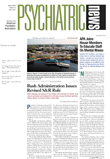Psychiatric residential treatment facilities that receive Medicaid funding for inpatient youth services must be in immediate compliance with the revised standards for the use of seclusion and restraint. Facilities with a current Medicaid agreement must provide documentation of compliance to their state Medicaid agency by July 21.
The Health Care Financing Administration (HCFA), the federal agency that oversees Medicaid, issued an interim final rule on seclusion and restraint in May with several changes from the previous version. The Bush administration had delayed the March implementation date of the rule designed by the Clinton administration for a 60-day review, which expired in May.
“We are pleased that the Bush administration has attempted to remedy several problems in the rule inherited from the Clinton administration,” said Nicholas Meyers, deputy director for congressional relations in APA’s Division of Government Relations (DGR). “For example, the definition of physical restraint now excludes temporarily holding a patient or escorting a patient by the hand or arm safely to another area.”
HCFA also clarified that the rule applies to psychiatric residential treatment facilities that receive Medicaid payment for inpatient services including a youth’s room and board and a comprehensive package of services. It also applies to psychiatric hospitals that meet the 1999 Medicaid standards on seclusion and restraint (Psychiatric News, October 1, 1999).
HCFA revised the rule’s definition of physical restraint and its reporting and staffing requirements to be consistent with the Children’s Health Act signed into law by President Bill Clinton last October, according to a HCFA press release (Psychiatric News, November 17, 2000).
HCFA also added a new requirement that facilities included in the rule must inform the federal agency of any deaths involving seclusion and restraint.
The Children’s Health Act allowed the Secretary of Health and Human Services (HHS) to issue regulations that are more stringent than the act’s provisions. However, APA protested to HHS in March that the staffing and reporting requirements in the interim final rule issued in January were burdensome and costly (Psychiatric News, May 5).
The interim rule allowed only a psychiatrist to issue the order to initiate seclusion and restraint to a registered nurse, and required a physician or a clinically qualified registered nurse to perform an evaluation of the patient within one hour of issuing the order.
APA and the Pennsylvania Psychiatric Society complained to HHS that compliance would mean hiring additional psychiatrists and registered nurses to be available 24 hours a day, seven days a week, which could force some psychiatric residential treatment facilities out of business.
The decision by HHS to revise the rule’s staffing requirements was based on several comments it received about the “severe shortage of registered nurses and unavailability of psychiatrists,” according to HCFA.
The amended rule allows a physician or other state-licensed practitioner to issue orders for the use of seclusion and restraint and to evaluate the patient within one hour, according to the HCFA press release. Another change is that in addition to registered nurses, the rule allows licensed practical nurses to receive the physician’s or practitioner’s verbal order.
“These requirements ensure that seclusion and restraint will be conducted only by properly trained personnel while accommodating the staffing challenges that facilities face today,” said HHS Secretary Tommy Thompson in the press release.
DGR Director Jay Cutler commented in an APA member update, “We view any changes easing the burden of compliance as a positive development.”
HCFA recognizes however, that “some facilities will have to hire additional registered nurses or other licensed practitioners to meet the requirement for 24 hour per day coverage,” according to the regulation.
The Bush administration did not change the following requirements that were included in the Clinton administration rule:
• Seclusion and restraint may not be initiated simultaneously.
• Residents aged 18 to 21 cannot be restrained or secluded for more than four hours, residents aged 9 to 17 for more than two hours, and residents aged 8 and under for more than one hour.
• A debriefing with staff involved in the procedure and the resident must be held within 24 hours. Staff must also discuss the incident with their supervisor.
• Staff must be trained in the safe use of restraint and CPR and demonstrate their competencies twice a year.
Said Cutler, “The seclusion and restraint debate is of course, larger than the psychiatric residential treatment facility rule. We continue to be deeply concerned about the proliferation of overlapping, duplicative and inconsistent standards across settings” (see box).
APA Medical Director Steven Mirin, M.D., and DGR staff plan to raise these concerns when they meet with senior White House staff later this summer.
DGR is submitting a comment letter to HHS on the changes to the rule this month.
Additional information can be obtained by calling DGR at (202) 682-6060. The full text of the HCFA amendments is available at www.access.gpo.gov/su_docs/fedreg/a010522c.html by scrolling to “Health Care Financing Administration,” “Rules,” and “Medicaid.” ▪
